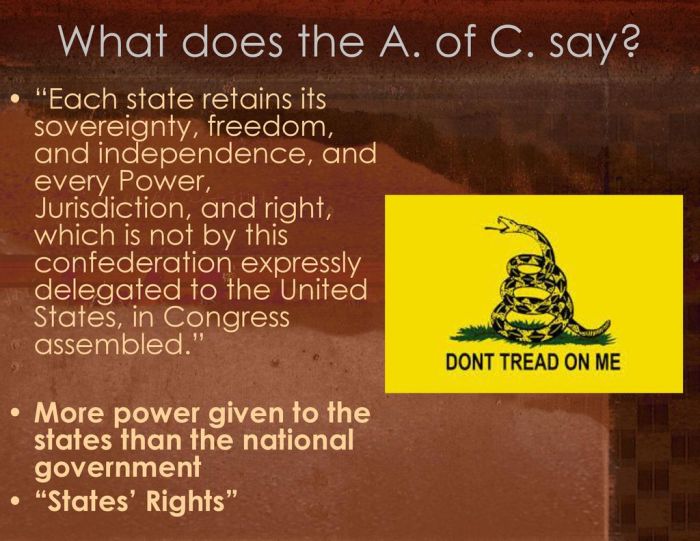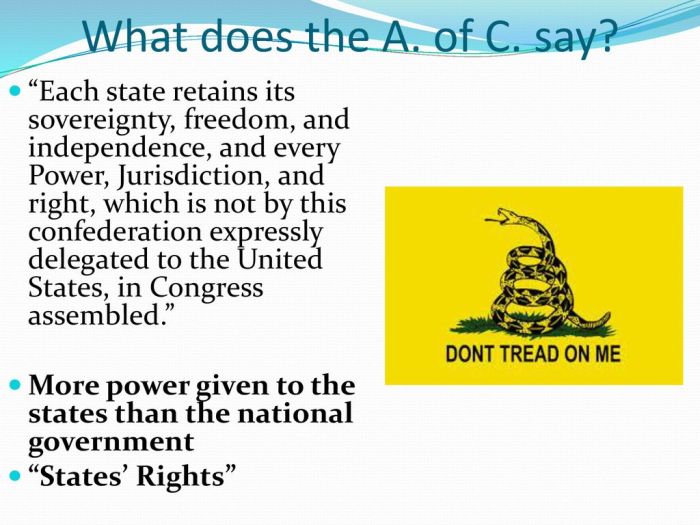Advantages of a confederate government take center stage in this captivating exploration, inviting readers to delve into a nuanced examination of a unique governing system. Confederate systems, characterized by their decentralized decision-making and emphasis on states’ rights, offer a compelling alternative to traditional federal structures.
Throughout history, confederate governments have played a significant role in shaping political landscapes and fostering economic prosperity. This analysis delves into the key advantages of confederate systems, examining their ability to empower local authorities, promote regional growth, and enhance political flexibility.
Historical Origins and Background: Advantages Of A Confederate Government

Confederate governments trace their origins to ancient political systems, where alliances of sovereign entities formed to address common concerns. In the 18th and 19th centuries, confederations emerged as a popular model for newly independent nations seeking to balance local autonomy with collective action.
Confederate systems differ from federal systems in that member states retain their sovereignty and decision-making authority. While federal governments centralize power in a national authority, confederations emphasize decentralized governance and the protection of states’ rights.
Advantages of Decentralization
Decentralization in confederate systems empowers local authorities to tailor policies and decisions to their specific needs and circumstances. This local autonomy fosters innovation, experimentation, and responsive governance.
Confederate governments also uphold states’ rights, ensuring that member states have a voice in decision-making processes that affect their citizens. This autonomy promotes a sense of ownership and responsibility among local governments.
Economic Benefits
Decentralized economic policies in confederate systems allow regions to pursue economic strategies that align with their comparative advantages. This specialization can drive regional growth and development, creating a more diversified and resilient economy.
Free trade and economic cooperation within confederations promote economic integration, reducing barriers to trade and facilitating the flow of goods, services, and capital.
Political Flexibility, Advantages of a confederate government
Confederate governments provide flexibility in decision-making, as member states can negotiate and compromise on issues of common interest. This consensus-building process fosters collaboration and minimizes the risk of political gridlock.
The decentralized nature of confederate systems allows for experimentation and innovation in governance. Member states can implement different policies and approaches, sharing best practices and learning from one another.
Historical Examples
Throughout history, several successful confederate governments have existed. The United States under the Articles of Confederation (1781-1789) is a notable example. The Swiss Confederacy, established in 1291, has maintained its confederate structure for centuries.
These historical examples demonstrate the potential longevity and effectiveness of confederate governments in fostering cooperation and preserving local autonomy.
Modern Applications
In contemporary governance, confederate models offer potential applications for regional cooperation and conflict resolution. The European Union, while not a traditional confederation, incorporates elements of confederate governance in its structure and decision-making processes.
Confederate arrangements can provide a framework for addressing shared challenges and promoting economic integration in regions with diverse interests and political systems.
FAQ Insights
What is a confederate government?
A confederate government is a type of political system in which power is divided between a central authority and constituent states or provinces, with each retaining significant autonomy.
What are the advantages of a confederate government?
Advantages of a confederate government include decentralized decision-making, empowering local authorities, promoting regional economic growth, enhancing political flexibility, and safeguarding states’ rights.
How does a confederate government differ from a federal government?
In a confederate government, the central authority has limited powers, while constituent states retain greater autonomy compared to a federal system, where power is more centralized.


